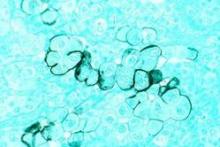Using parameters routinely collected in patients with pancreatic cancer, the Khorana score and the blood urea nitrogen (BUN) level were significantly associated with early mortality in patients with pancreatic cancer who underwent surgical resection, according to a report published in the journal Cancer.
Dr. Davendra P.S. Sohal, an oncologist at Cleveland Clinic, and his colleagues stated that by identifying patients with resectable pancreatic adenocarcinoma who are at high risk of early mortality, the parameters “may be used to stratify patients, and ultimately may be used to select high-risk patients for more aggressive therapies in prospective studies” (Cancer 2015 [doi:10.1002/cncr.29298]).
Multivariate analysis showed the risk for early mortality (before 6 months) increased with high-risk Khorana score (hazard ratio, 2.32; 95% confidence interval, 1.04-5.13; P = .039) and elevated blood urea nitrogen (HR, 4.34; 95% CI, 1.84-10.25; P < .001). The authors noted that other key variables, such as TNM classification of malignant tumor staging, were not associated with early mortality.
The study evaluated 334 patients, median age 67 years, who underwent surgical resection of pancreatic adenocarcinoma during 2006-2013 at the Cleveland Clinic. With a median follow-up time of 39.4 months, there were 205 deaths (61%), and median overall survival was 21.3 months. Within 30 days after surgery, 3 (0.9%) deaths occurred, and within 6 months of surgery, 29 (8.7%) deaths occurred. Most tumors were located in the head of the pancreas (73%); most pathologic stages were T3 (67%) and N1 (63%); median Khorana score was 2; 47% of patients had a score ≥ 3; 59% had comorbidities. Some of the patients received preoperative anticancer therapy, making the study population heterogeneous in that respect.
The Khorana score, a measure of venous thromboembolism risk, combines five items: cancer site, platelet count > 350/nL, white blood cell count > 11/nL, hemoglobin <100 g/L, and body mass index (BMI) ≥ 35 kg/m2; Khorana scores of 3 or greater indicate high risk.
A novel finding in patients with pancreatic cancer, elevated BUN levels have been previously linked to poorer prognosis for patients with non–small cell lung cancer and advanced malignancies who were receiving palliative care. Elevated BUN levels may indicate subclinical renal dysfunction or other comorbidities that influence survival.
Univariate analysis in the current study did not find an association between early mortality and BMI, which may be due to the timing of the measurement. Patients may experience cancer-induced weight loss that renders BMI measures falsely low. The association between BMI and decreased survival after pancreatic cancer diagnosis was found previously to be strongest when BMI was taken 18-20 years prior to diagnosis.
The authors note that although perioperative mortality has improved considerably in recent years, there exists a subgroup of patients who experience early recurrence.
“These patients may not benefit from the current standard of care but to our knowledge, little is known regarding how best to identify such patients at high risk of early mortality,” wrote Dr. Sohal and his associates. The current study identifies a simple set of baseline parameters that may allow for “easy targeting of high-risk patients for specific interventions aimed at improving clinical outcomes.”
Dr. Sohal reported having no disclosures. Dr. Khorana has received fees from several industry sources for work outside of the current study.

